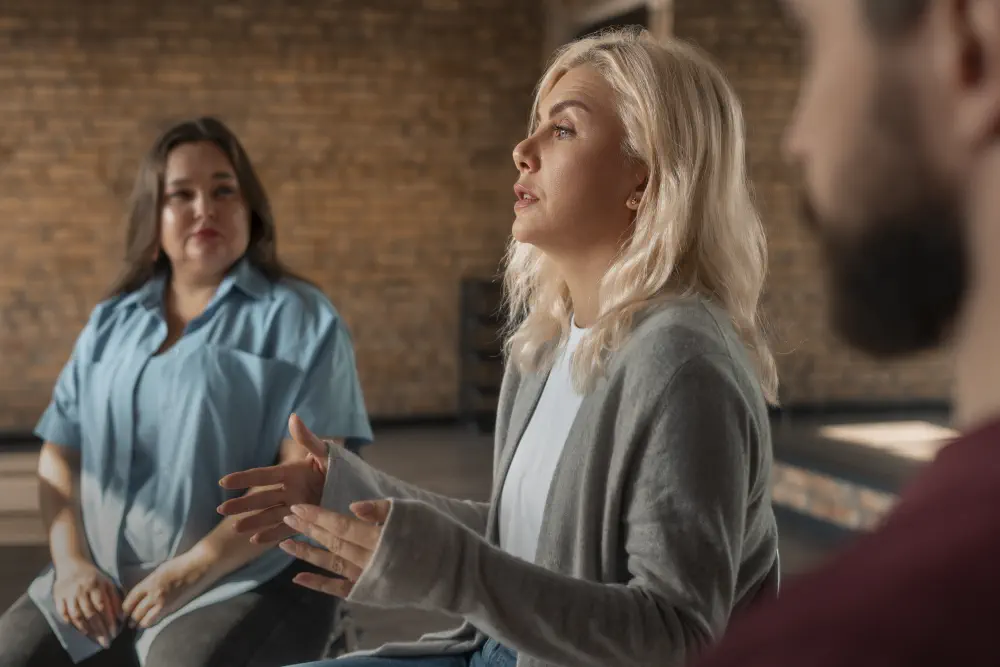We offer medical detox and multiple addiction treatment options in our
luxury treatment centres in Port Hope, Cobourg, and Ottawa.
Nodding Off: Understanding the Signs and Risks of Addiction
The signs are unmistakable once you know what to look for. A body slumped forward in a chair. The chin repeatedly dropping to the chest before jerking upward, only to drift downward again moments later. Speech becomes slurred, eyes barely open. This isn't ordinary fatigue, it's something entirely different. This distinctive pattern is what healthcare providers identify as "nodding off."
Key Takeaways
- Nodding Off as a Warning: Nodding off, marked by fluctuating awareness and head bobbing, signals opioid intoxication and potential overdose.
- Substances Involved: Opioids like heroin, fentanyl, and prescription painkillers cause nodding, with fentanyl being particularly dangerous.
- Signs to Watch For: Look for pinpoint pupils, slurred speech, irregular breathing, and behavioural changes like withdrawal and neglect.
- Immediate and Long-Term Risks: Nodding off can lead to respiratory issues and unconsciousness, with long-term effects like cognitive decline and organ damage.
- Getting Help: Early intervention, naloxone use, and professional treatment options are crucial for recovery.
Across Canada, opioid-related emergencies have surged over the past five years. In 2023, over 7,000 Canadians died from opioid toxicity, each representing a family torn apart by addiction. For many, the first visible warning sign was this characteristic nodding behavior, a red flag that might have led to earlier intervention.

This article analyzes the concept of "nodding off" in the context of substance use, its underlying causes, the specific drugs that induce this phenomenon, and appropriate responses upon observing these warning signs.
What Does "Nodding Off" Mean?
We've all caught ourselves drifting off during boring meetings or late-night television. But the nodding off meaning in addiction contexts differs dramatically from ordinary drowsiness.
When an individual "nods off" as a result of substance usage, they experience a fluctuating state of awareness. Their head tilts forward as they temporarily lose consciousness, then partially regain awareness, only to slide back to unconsciousness again moments later. This cycle produces a unique bobbing motion, therefore, the designation "nod."
From a neurological perspective, opioids hijack the brain's receptors, triggering dopamine release while simultaneously depressing vital functions. This creates a dangerous tug-of-war between euphoria and sedation. The brain essentially flickers between these states, causing the person to nod off repeatedly over several hours.

You might notice someone:
- Drifting in and out of alertness mid-conversation
- Speaking a few words before trailing off incomprehensibly
- Maintaining unusual postures while semi-conscious
- Having constricted pupils despite dim lighting
- Scratching themselves frequently, especially their nose and face
- Showing delayed reactions when addressed
Unlike normal sleepiness, the nod off meaning in this context signals active drug intoxication, and potential danger.
Substances That Cause Nodding
While several substances can make users drowsy, the rhythmic pattern of nodding off on drugs typically points to opioids:
Heroin
The classic heroin nodding pattern has been documented for decades. After injection, smoking, or snorting, users experience an initial rush of euphoria that quickly transitions to a dreamlike state. This semi-conscious condition can last hours, with the person floating between awareness and detachment—the signature nod.
Fentanyl
The fentanyl nod looks similar to heroin-induced nodding but carries far greater risks. At 50-100 times morphine's potency, fentanyl leaves virtually no margin for error. Even experienced users can easily overdose, especially since much of Canada's street drug supply contains unpredictable amounts of fentanyl. In British Columbia alone, toxicology reports showed fentanyl in 85% of 2023's overdose deaths—often in drugs sold as something else entirely.

Prescription Opioids
Pills like oxycodone, hydrocodone, and morphine can also cause nodding when misused. This often happens when people:
- Take larger doses than prescribed
- Crush and snort pills meant for oral use
- Combine opioids with alcohol or benzodiazepines
- Use someone else's prescription
Combination Threats
When wondering “What drugs make you nod off?”, it's worth noting that mixing substances dramatically increases risks. Benzodiazepines or alcohol combined with any opioid can intensify respiratory depression, making the nod deeper and more dangerous.
As tolerance builds, users need increasing amounts to prevent withdrawal and achieve the desired effects. This escalation pattern drives many deeper into addiction, with nodding off episodes becoming more frequent and pronounced.
Spotting the Warning Signs
Telling the difference between normal tiredness and someone nodding out could save a life. Here's what to look for:
Physical Signs
Beyond the characteristic head-bobbing, watch for:
- Pinpoint pupils that don't dilate properly
- Slurred or garbled speech that comes and goes
- Unusual breathing patterns (shallow, irregular, or occasionally pausing)
- Drowsiness regardless of time of day or recent sleep
- Difficulty staying upright or maintaining balance
- Slow, deliberate movements as if moving through water
Behavioral Patterns
- Neglecting responsibilities that were previously important
- Withdrawing from family activities and social circles
- Unexplained financial problems or missing valuables
- Wearing long sleeves regardless of weather (potentially hiding injection marks)
- Drastic mood swings between drug use episodes
The meaning of "nod off" extends beyond momentary unconsciousness—it represents a dangerous state in which breathing can slow to hazardous levels. According to 2024 data from Canadian emergency departments, approximately 40% of patients exhibiting severe nodding symptoms required respiratory support.

Dangers Beyond the Nod
Nodding off isn't just uncomfortable to witness—it signals serious and potentially fatal complications.
Immediate Hazards
- Respiratory depression that can progress to complete breathing cessation
- Loss of consciousness in dangerous locations (while driving, near water, etc)
- Choking on vomit during periods of unconsciousness
- Falls resulting in head injuries or broken bones
- Vulnerability to assault, theft, or exposure to elements
In Vancouver's Downtown Eastside, a 2023 community health survey found that 72% of people who regularly experienced nodding out reported injuries from falls, with 23% requiring hospitalization.
Long-term Health Impacts
The nodding off meaning encompasses more than just the immediate episode—it signals potential lasting damage:
- Brain injury from repeated oxygen deprivation
- Cognitive decline affecting memory and decision-making
- Liver and kidney damage from drug toxicity and related infections
- Infectious disease risks (particularly for injection users)
- Malnutrition and general health deterioration
The transition from occasional nodding to frequent episodes often marks a turning point where casual use has evolved into physical dependence. At this stage, users may continue taking opioids not for euphoria but simply to avoid withdrawal symptoms.
When Someone You Love Is Nodding
Discovering a family member nodding off on drugs can be terrifying. Your response matters tremendously.
Immediate Response to Nodding
If someone is currently nodding out:
- Try to keep them awake and moving if possible
- Position them on their side if unconsciousness seems imminent (recovery position)
- Never leave them alone
- Call for medical help if breathing becomes labored or irregular
- Administer naloxone (Narcan) if available and you suspect opioid involvement
Starting the Conversation
When they're lucid:
- Pick a time when both of you are calm and neither is under the influence
- Focus on specific behaviors rather than making accusations
- Express concern without judgment
- Listen more than you speak
- Offer to help them find resources without demanding immediate action
A Toronto mother whose son struggled with addiction shared: "I learned to separate the person I love from the addiction I hate. That distinction saved our relationship while I fought to save his life."

Finding Help in Canada
Opioid addiction that has progressed to regular nodding off usually requires professional intervention.
Emergency Options
If an individual is unresponsive or has blue-tinged lips or nails, immediately contact emergency services at 911. Remember that Canada's Good Samaritan Drug Overdose Act offers legal immunity to anybody requesting emergency assistance in overdose incidents.
Naloxone kits are available without a prescription at pharmacies across Canada. Many community organizations offer free kits and training on their use.
Treatment Approaches
Medical Stabilization
Supervised detoxification provides comfort drugs to alleviate withdrawal symptoms such as nausea, anxiety, muscle pain, and insomnia. This essential initial step must occur under medical supervision due to the severity of opioid withdrawal.
Medication Options
For many recovering from opioid addiction, medications provide a bridge to stability:
- Methadone: A long-acting opioid agonist that prevents withdrawal while blocking euphoric effects
- Buprenorphine/naloxone (Suboxone): A partial agonist with a "ceiling effect" that lowers overdose risk
- Slow-release oral morphine: An option for those who don't respond well to other medications
- Naltrexone: An opioid antagonist that blocks opioid effects entirely
These medications, when properly prescribed, eliminate the nodding effect while reducing cravings and allowing patients to rebuild their lives.
Psychological Support
Recovery involves more than addressing physical dependence. Evidence-based approaches like:
- Cognitive Behavioral Therapy to modify drug-related thoughts and behaviors
- Motivational Interviewing to strengthen commitment to change
- Contingency Management using positive reinforcement for sobriety
- Family therapy to heal relationships damaged by addiction
Rehabilitation Settings
Canadian treatment options include:
- Outpatient counseling for those with strong support systems
- Intensive outpatient programs (several hours daily)
- Residential treatment for comprehensive care (addresses both medical and psychological dependence)
- Recovery houses for transitional support
The Canadian Centre for Addictions offers personalized assessments to match individuals with appropriate care levels based on their unique circumstances.

Finding Your Way Forward
When someone you care about exhibits signs of nodding off on drugs, or if you recognize these patterns in yourself, remember that this symptom signals a medical condition requiring attention, not a moral failing.
Recovery from opioid addiction is challenging but entirely possible. Every day, Canadians move beyond addiction to rebuild meaningful lives. The key lies in connecting with appropriate supports early, before nodding progresses to more dangerous stages.
If you're concerned about heroin nodding or fentanyl nod behaviors in yourself or someone you love, reach out to one of the resources below. The conversation you start today could save a life tomorrow.
Hope Exists
Addiction may feel overwhelming, but recovery happens every day. With appropriate medical support, psychological care, and community connection, people can overcome even severe opioid dependence. The path forward begins with recognizing warning signs like nodding off and taking that crucial first step toward help.
Remember: Addiction affects people from all walks of life. Behind every statistic is someone's loved one—someone worthy of compassion, dignity, and the chance to heal.
FAQ
Is nodding off always a sign of drug use?
While nodding off can mean simple drowsiness in casual conversation, the specific cycling pattern described here strongly suggests opioids. Medical conditions like narcolepsy can cause similar symptoms, but the rhythm of opioid nodding typically looks different.
What's the difference between heroin and fentanyl nodding?
They look similar, but fentanyl nodding often develops faster and appears deeper. The main difference is risk; fentanyl's potency means a much smaller margin between sedation and overdose.
How long does nodding typically last?
Nodding off on drugs can last from 30 minutes to several hours, depending on the substance, dosage, tolerance, and metabolism.
Can someone who's nodding hear me?
During nodding, consciousness fluctuates. They may respond during alert moments, but typically won't remember conversations later.
What drugs besides opioids cause nodding?
While opioids are most associated with classic nodding, benzodiazepines combined with alcohol or GHB can cause similar effects. However, the rhythmic cycling between consciousness states is most characteristic of opioids.






